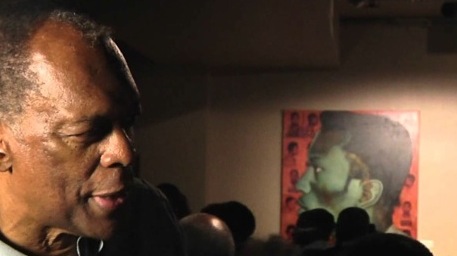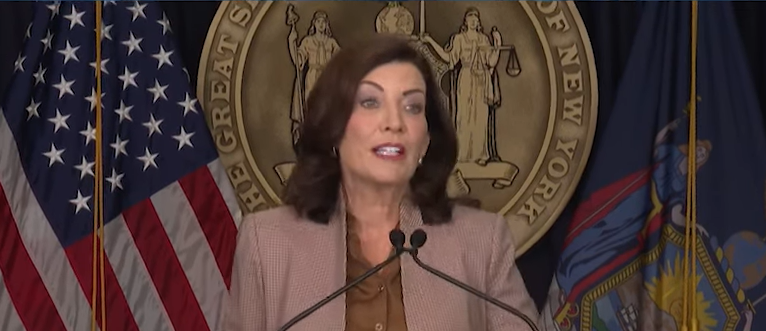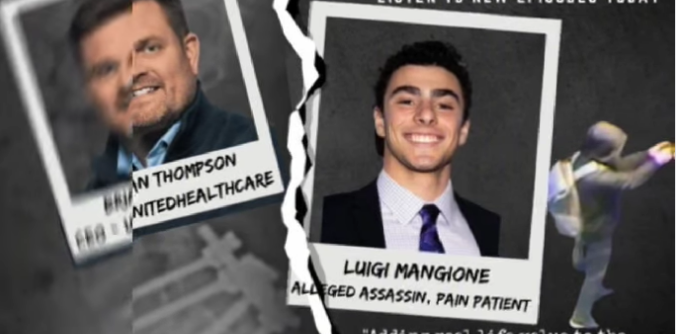Bob Law
Bob Law, of “Night Talk” fame, sponsored another of his tremendously informative Forums at historic Church of God in Christ on Kingston Avenue in Brooklyn, December 17, 2013, 7:00 – 10:00 pm, this time in tribute to Nelson Mandela.
After Bob Law had laid the foundation for comprehensive understanding of Mandela’s passing. Dr. Leonard Jeffries provided a scintillating analysis and then synthesis for the some 100 persons who braved the inclement weather to see beyond the outward appearance of global, even South African, tribute to the fallen leader, icon and freedom fighter.
Both Mr. Law and Dr. Jeffries were painstakingly meticulous in turning on its head much of the Mandela tribute from world leaders and Western media by focusing not on the man as a mountain, but as a “tree” in a forest of freedom fighters.
This point was elucidated in “Mandela and the Unfinished Freedom Struggle” Daily Challenge, 12/17/13, p. 5, where Ron Daniels wrote, “Mandela was the ‘tallest tree’ in a forest that included many movements and stellar leaders, e.g., the Pan African Congress, Black Consciousness Movement, Mass Democratic Movement, Steve Biko, Bishop Desmond Tutu, Allan Boesak, Cyril Ramaphosa, Albertina and Walter Sisulu and Oliver Tambo to mention a few.
This is an important note because there is a tendency to cast successful movements as the result of the acts of a solitary heroic figure.” We should also include the Afrikaner cleric Byers Naude. Many attributes as demonstrated loyalty to his tribal heritage, his education and profession as a lawyer, his activism and daring; and his role as student, husband and family man. These scholars who conceptualize so readily and well, were quick to point out the cliché, he went from “Prisoner to President” and his steadfast “commitment to reconciliation;” does not tell the full story that he was forced into armed struggle; convicted and while in prison those 27 years became a symbol, an icon; yet, the struggle continued to be waged by others on the outside suffering at the hands of the oppressive and repressive regime that banned, tortured and killed many.
It’s universally recognized, the Afrikaners who perpetrated the racist, evil system of apartheid, did not suddenly have an epiphany and decided to free Nelson Mandela. Like Ian Smith of Rhodesia, they hoped to rule for another 1000 years, though in 1000 days power was wrestled from Smith by “the boys in the bush.” In the case of South Africa, it was the insistence, commitment and unrelenting struggle of the women, the young people, the African National Congress cadre and the global mobilization for divestment to rid the world of the evil system that apartheid represented, despite President Reagan and Chester Crocker’s policy of “constructive engagement” that contributed to Mandela’s and South Africa’s freedom struggle.
This is what forced the half-hearted offer by President Pieter Botha’s offer to free or release Mandela in 1988. Such release, however, was dictated only if he would renounce violence! clearly, if Mr. Mandela did accept an early release under those conditions it would have undermined everything he stood for, what he spent those many years incarcerated to achieve, and he would have lost the respect of the South African people whom he represented as well as the people of the world who stood with him and pressured change agents demanding his release.
It has been acknowledged; globally Africans see the world differently because of their shared racist imperial and colonial experience. That is why Mr. Law wanted his audience to begin to understand the continuity of that experience. That is why he insisted “We not let others tell the story,” for when they do its with a twist that actually distorts the experience. The “Prison to President” cliché is thus not correct! First of all, he did not commit a crime; yet, as a man of principle, he was willing to forgive all the wickedness of the apartheid regime and this demonstrated his humanity was of a higher standard than theirs.
Though he was called a terrorist, he was actually a freedom fighter who became President! Prison was only a step on the way! In the horrendous experience, there was a long history of struggle against the murderous, vicious racist expropriators of the very best African land confining Africans to “black spots,” then removing them into balkanized and barren reserves called “Bantustans” that were supposed independent nations, yet dependent on South Africa, of course, with the whites in control, politically and economically.
This behavior and much more forced the African National Congress to pick up the gun. These African people of that nation were actually pressed into the armed struggle amidst the hopelessness and dehumanization instituted through fear and intimidation and use of stooges such as the Inkatha Movement of Chief Buthelezi. That is why Mr. Mandela insists Xhosa, Sotho, Zulus, all Africans, are one people suffering under the same oppressive system. The racists fermented a blood bath between the Africans before they could fight the white man! Yet, Mr. Mandela would say, “Let us forgive these wicked people who have oppressed us for so long!” Importantly, nobody went behind his back seeking vengeance! No one sought to assassinate or injure those who perpetrated the system. Much more significant, because Mr. Mandela refused to compromise his principles, his was liberation in a real sense! This demonstrated the tremendous patience of the African people while these so-called “superior white folks” were stealing their land and its riches. Showing magnanimity, in his uncompromising stance, he denounced violence from both black and white elements. This is because Mr. Mandela understood the potency of violence and its impact on the people and nation in its policy, infrastructure and view of the world.
Naturally, most people never really or fully understood Mr. Mandela or his strategy. It can be assumed Mr. Mandela went to prison an angry man after his trial but he was still a proud man! Observe his walk into prison! He probably never expected to be freed one day. In that “Long Walk,” he experienced much and had the time to reflect, think and strategize. He said he matured! He knew he represented the people; he had them on his side. He also studied his enemy. He learned Afrikaans, the language of the oppressor, so he better understood their history and culture and this was important in his negotiations to end apartheid.
In reflecting, Madiba probably thought “We may be able to kill some whites but Africans would suffer more in any bloodbath.” They knew he was coming and expected riotous behavior, so they stockpiled their armaments. They strategized and erected their forts and barriers, their “Alamos” to create their “Amritsars.” Madiba outfoxed the devils! He said no recrimination! “Africans, let us forgive the white citizens of our nation.” Thus, their arms were useless, ineffective, their barriers yet showed their thinking and bunker mentality! As Sun Tzu advised, “Win the battle before taking the field!” To recall, even more, Nkrumah had said, “Seek ye first the political kingdom.”
In the South African system, whites controlled economics and politics. Mandela realized he could not dislodge them from economic control. By virtue of the Black majority and to keep democracy alive he chose the democratic way to political power. Ron Daniels said it best. Mandela theorized through political power the African people will whittle away at the preponderance of white economic dominance. One African lady explained why she loved Mandela in part; Soweto had no electricity, the night belonged to whites! Now they have electricity and she has a fridge and TV. The muddy roads are now paved. These were government efforts initiated by Mandela. Unrelenting political effort over time will economically empower Africans much further.
Much more significantly, Mr. Mandela’s humanity pulled the mask off the white racists and he exposed their true selves. He was well versed in his historical responsibility, coming as he did from a community with a royal duty to the people of his land. That is why we must seek to fully understand in putting him in proper perspective. The Western and American media does not tell or focus on Mr. Mandela’s and the ANC’s true role in the total liberation of African people and the struggles of pushing back colonialism as well as the significance of true elimination of the immoral system of apartheid. In reality, it’s who he forgave rather than what he forgave them for is really the issue and this forces another look at the Afrikaner Boers, South Africa and Mr. Mandela.
In one of the features run in the media recently about an Afrikaner Museum, a young woman visiting boasted of her need to know her history! It is clear the museum would not recount the brutality, the killing, the African humiliation, the wrongs, so that is why the Africans must know and tell their story to get a more balanced view for historical recounting. Mandela’s insistence on the Truth and Reconciliation Commission was a masterful stroke! In the many confessions it gave the “monsters” a chance to reveal their mechanism of control for the world to realize how right they were that apartheid must go.
Changing pace, in a musical interlude Craig Crawford played a beautiful jazz rendition of a tribute and he followed this up with another really great songs. Also, Xavier Bost sang two wonderful pieces, “Shattered but not Broken” and “A Hero Lies in You.” Bob Law then praised the musicians and audience for being “Credoso Africans” who were “strong and resilient.” He even tied this personality trait to the tenacity of braving the weather to attend the event, insisting more such forums are planned.
Not discounting that Mr. Mandela was a good man; they however, pointed out, but he was not unique as a freedom fighter. Mr. Law expressed, “We came from a long line of freedom fighters who fought courageously in liberation struggles.” This is why he insisted, “It is important that we claim our own history.”
At that point he mentioned African leaders of Mr. Mandela’s stature such as Ghana’s Kwame Nkrumah, Guinea’s Sekou Toure, and Congo’s Patrice Lumumba who liberated their country and gave their all in its cause. These leaders were uncompromising liberation fighters. Of course, Mr. Samora Machel of Mozambique must also be numbered in this lot.
At this point Mr. law waxed philosophical by telling the audience, “When you celebrate Mr. Mandela, you celebrate yourself; you celebrate the African liberation struggle.” He spoke of “something on the inside that is so strong, Holy Spirit, Holy Ghost,” that cannot be touched or conquered that contributed to his and successes. Then he reflected on an old African liberation saying, “The higher they build the barriers, the taller you will rise.” Even further, “To celebrate Mr. Mandela, let every leader be a Mandela” who refused to hate, was uncompromising, principled, and a man of great integrity. Despite his circumstances, he continued to fight which showed his character. He fought for what was right and would not compromise. This is what his enemies had to recognize. He fought against poverty, against inhumanity of man to man. He recognized gay rights and praised education.
Bob Law insisted, we must guard against “People who will come to confuse us, who will betray us.” Because Mr. Mandela would not compromise, would not back down, Mr. Law quoted biblical wisdom to reflect his strong, principled personality, for “No weapon formed against me will prosper.”
Even more philosophical and spiritual, he offered, “You think you are doing it on your own,” but divinely guided forces are at play in guiding your every move! To explain where Mr. Mandela got his strength poses a profound proposition; for Mr. Law quotes Isaiah the prophet who wrote, “They that wait on the Lord shall renew their strength, they shall mount up with wings of eagles; they shall run and not be weary; they shall walk and not faint.” This strength, this life in commitment to struggle, is a reminder of how great as a people the audience really is! This again is why we must not let them separate Madiba Mandela from the continuity of the history of his people.
Bob Law used analogies to get his point across. He asked the audience to Google two interviews between Malcolm X and Mike Wallace and Farrakhan and Wallace on “The Hate that Hate Produced.” He veered off to speak on the disrespect Blacks receive, especially when shopping at high-end stores such as Barney’s. He spoke of the young lady at Barney’s who “Was not arrested for shoplifting but for spending too much” when she bought the $2500.00 ladies bag! He also talked about new and upcoming ventures of the church in addressing the suffering of families, families of loved ones in prisons. People never really understand the hurt they put their families through when they commit a crime and go to prison. The family, the mothers, brothers and sisters, sons and daughters, also do the time on the outside. This suffering is what the church will now address.
Next it was Leonard Jeffries’ turn, late as he always is! Jokingly Mr. Law referred to the keynote speaker as “The Late Dr. Jeffries.” Pulling no punches, he focused not just on Nelson Mandela but the moment of African Liberation. While the focus today is on Mr. Mandela, Dr. Jeffries insisted, for 27 years he was only a symbol! At the funeral Winnie and Graca demonstrated the strength of the black woman. These women were the wind that powered their husbands’ sails.
There were many similarities in the struggles of the ANC (1910) and the NAACP (1912) who sought to restore African humanity in a world of white rapaciousness. In South Africa it was the African National Congress, the Pan-African Congress, the Student Movement that gave us Steve Biko and of course the church, in close association with the World Council of Churches under the leadership of Dr. Philip Potter in which Dr. Jeffries and Professor Scobie, in Geneva, were lending assistance to coordinate activities in the South African struggle. From this vantage position he realized and stated emphatically, “The most devastating destruction of the Black man was in South Africa.”
In that horrific experience was the 1962 Sharpsville massacre and the June 16, 1976 student uprising in Soweto that demonstrated the viciousness of the white minority regime. However, efforts to brain-wash the students in demands that they learn Afrikaans was “more than a bridge too far,” it was a tremendous miscalculation! The Africans suffered but the move failed.
First, in laying out his presentation, Dr. Leonard Jeffries reminded the audience, the Boers comprised Dutch, German and French elements from Europe mingled with Britons. With the discovery of the gold and diamond wealth of South Africa in late 19th Century, his “3 Rs,” were not reading, ‘riting and ‘rithmetic, but Rothschild, Rhodes and Rockefeller who conglomerated to exploit the riches. A secret society called the Broderbund of some 20,000, men swore to maintain power no matter what. This is what Mandela challenged.
Thus, “If there is a place for Reparations it is South Africa.” The Boers fostered unity among Europeans and divisions among Africans. They used the Zulu Mpande to kill his brother Shaka. The same way they “encouraged” Chief Buthelezi of ferment violence among Africans. This created a universal moral crisis. In their grab, that minority took 85 percent of the land. However, despite Mandela’s victory, “We won the battle but they won the war” by remaining in control of the nation’s economics.
Dr. Jeffries shed light on Afrikaner examination of the role of the church in the struggle. They studied Archbishop Tutu’s many speeches, dissecting the many times he mentioned the ANC. They realized they were fighting the church on the inside and the freedom fighters on the outside. They entrapped and neutralized Rev. Boesak rendering him ineffective as a voice in liberation theology.
Dr. Jeffries explained further, “Politics is what you do to control your economics.” His synthesis depicted a triangle compromising economics, politics and culture, the mind values, he called it. Importantly, he pointed out, the 1948 election victory of the Nationalist Party “set in motion the dehumanization process of Africans.”
This resulted in “The African people suffering from a shattered consciousness and a fractured identity.” Again, emphasizing the need to organize economics, politics and culture, and the role of women – Winnie Mandela; children – Steve Biko; church – Archbishop Desmond Tutu and Rev Allan Boesak, Dr. Jeffries insisted, “To serve the people, the curriculum of inclusion is not sufficient, we need a curriculum of liberation.”







